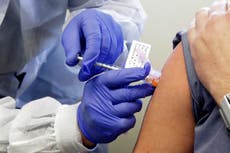Can employers force their employees to take the coronavirus vaccine?
Employers have every reason to mandate the vaccine for their employees, but they probably will not
Pfizer and Moderna's coronavirus vaccines are on track for widespread distribution throughout 2021, a development which will likely prove a major relief to employers who have lost business and have had to invest in costly adaptations to deal with the restrictions imposed due to the virus.
Despite the potential for the vaccines to help curb the virus and begin restoring a sense of normalcy to American life, recent surveys from Pew Research reported that 42 per cent of Americans are wary of the vaccine and say they will refuse to take the drug.
Dr Anthony Fauci, Director of the National Institute of Allergy and Infectious Diseases and the White House's top doctor responding to the coronavirus, has said that an overwhelming majority of Americans will have to take the vaccine in order for it to effectively reduce the spread of the virus to a point where life can resume as normal.
For employers in industries where employees work closely with each other and with customers - factory floors, assembly lines, and the service industry, for example - employers may consider mandating their employees received the vaccine. But can they?
Employers rights to mandate
Experts say employers can mandate their employees take the vaccine, though there are several caveats that could allow for exemptions.
Lindsay Ryan, an employment lawyer, told CNBC that employers can compel employees to take the vaccine, though those with "deeply held religious beliefs" or specific medical conditions may be exempted, so long as exempting them does not come at a significant cost to the company.
She said that “under federal law, employers don’t have to grant a religious accommodation if doing so would result in more than a de minimis cost to the operation of the business.”
De minimis is a legal term referring to a cost so small to a business as to be insignificant. Since the pandemic has had an enormous impact on businesses and unvaccinated employees could open employers in certain states to liability lawsuits, it is likely employers would have the legal ground to force their employees to take the drug.
In May, the Equal Employment Opportunity Commission ruled that it was legal for employers to force employees to take coronavirus tests, and that same power may extend to employers when it comes to compelling vaccine use.
However, just because employers can compel the vaccine does not mean they will.
Why employers might not make the vaccine compulsory
Peter Meyers, a law professor at George Washington University Law School, told Reuters that it was unlikely companies would compel the vaccine due to the controversy surrounding the drug.
“Companies could theoretically issue a mandate, but in the current political climate it is very unlikely they will do so,” he said. “Americans tend to shy away from mandates.”
If any industries compelled the vaccine, it would likely be the healthcare industry. Vaccine mandates are common in the healthcare industry and it is unlikely that the coronavirus vaccine will be any different, especially considering the health risk posed by the virus.
Some union contracts - including those in the healthcare industry - prevent companies from compelling vaccination.
Will employees who refuse a vaccination be at risk of catching the virus if the rest of their coworkers take the vaccine?
Employees may feel comfortable refusing the virus if the rest of their coworkers take the drug, assuming they will be safe as a result. However, that is not necessarily the case.
Health experts do not know yet if the vaccine prevents transmission of the virus.
The vaccine is meant to prevent people from developing the disease, Covid-19, not necessarily from becoming infected with the coronavirus.
That means that a vaccinated person could carry the coronavirus vaccine and pass it on to someone without the vaccine, who could then fall ill with Covid-19.
Dr. William Moss, a vaccines expert at Johns Hopkins University, spoke to CBS9 WUSA and explained that the Pfizer and Moderna vaccines may still allow for coronavirus transmission.
“So you know, everyone who gets disease has an infection, and the infection causes the disease,” Dr. Moss said. “But not everyone who is infected has the disease."
He said it was important to understand the distinction between the infection and the disease.
"What's being measured in the trials is whether or not they prevent disease, mild, moderate and severe disease,” Dr. Moss said.
Only AstraZeneca's vaccine - which is still in trial - has shown the potential for preventing transmission.
Which companies will be providing vaccines?
Pharmaceutical companies Pfizer and Moderna will provide the first batch of 100 million doses of their coronavirus vaccine. Several other companies, including AstraZeneca, are developing and testing their own vaccines.
The Trump administration's Operation Warpspeed has also established agreements with pharmacies CVS and Walgreens to provide vaccinations.
The US Centers for Disease Control and Prevention have recommended that healthcare workers and elderly people living in nursing homes be the first to receive the vaccination. After that, essential frontline workers like educators and police will receive the vaccine. Then individuals over the age of 65 and those with health considerations will receive the vaccine before it becomes available to the general public.
Join our commenting forum
Join thought-provoking conversations, follow other Independent readers and see their replies
Comments




Bookmark popover
Removed from bookmarks